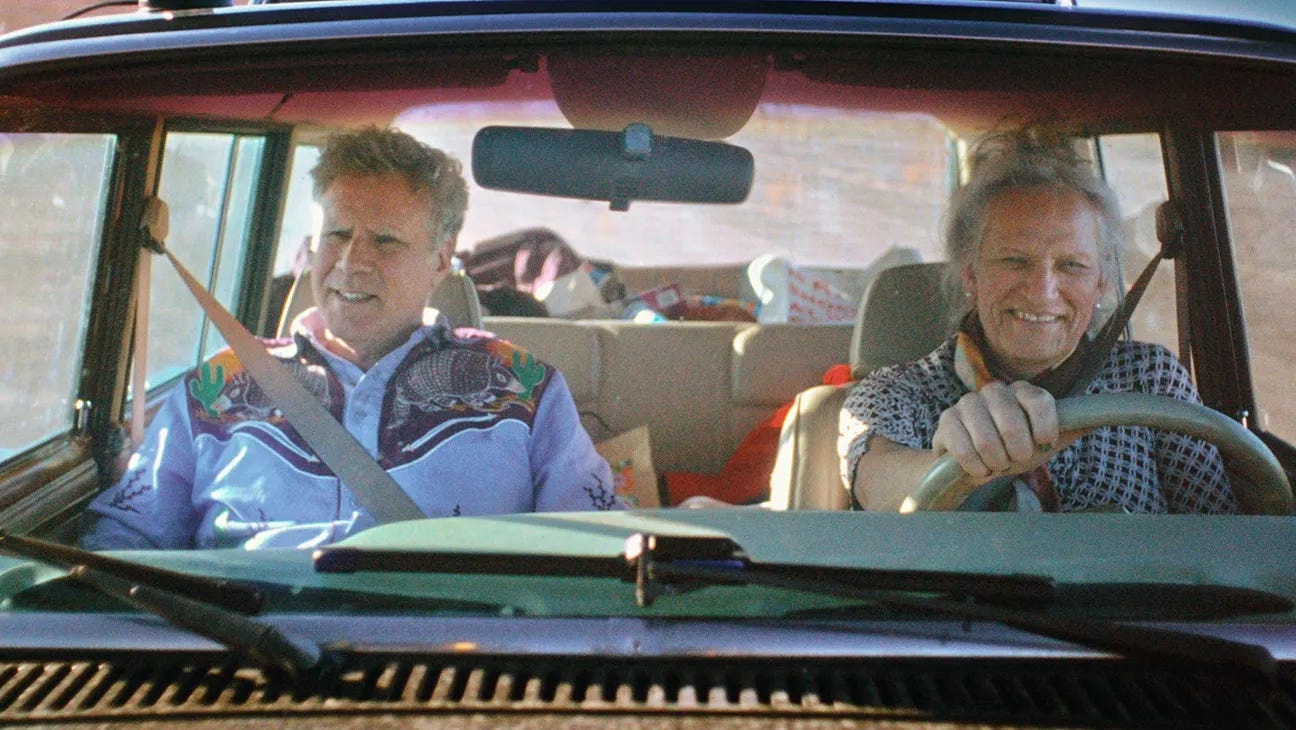TIFF ‘24 Review: ‘Will & Harper’
I have no doubt these people love Harper. But are they willing to not just celebrate her, but also denounce those in their community who are actively and regularly transphobic?
SNL alum, writer Harper Steele, misses cross-country road trips, seedy hotels, and dive bars. When Harper was closeted and presenting as a man, these spaces welcomed her without a thought. But now that she has publicly transitioned, she no longer is guaranteed the same safety and ease. Josh Greenbaum’s new documentary Will & Harper addresses Harper’s newfound trepidations by concocting a real-life buddy road trip comedy, where Harper and her old friend, comedy superstar Will Ferrell, journey across the United States for two weeks to see where, exactly, Harper fits in as her now fully embodied self.
There are some obvious privileges and protections in place for Harper, many of which are noted by Harper herself. The most obvious is that she has a majorly recognizable comedic celebrity by her side, there to diffuse tension with ease if needed, and the rarely or never mentioned, but obvious ones: Harper is white, she’s financially stable, and even when Ferrell is not with her, she’s flanked by visible cameras.
I am not here to complain about these privileges, or suggest anything at all about them. I believe that trans people everywhere deserve every protection and privilege they can be afforded. I wish Harper every pleasant and easy evening at a rundown dive bar or auto racetrack. And to be clear, at no point does Harper extrapolate a monolithic experience from her own individual one. She’s both aware of her privileges and supremely giving with what she allows to be brought forth for public consideration—answering questions that she could easily declare as private matters, and sharing deeply vulnerable journal entries from the past decade regarding her transition.
Harper’s willingness to open herself up to both joy and scrutiny, both on the trip itself and within the confines of the documentary, and Ferrell’s insistence on uplifting Harper’s transition visibly and loudly, are the key positive features of Will & Harper. There’s no doubt that these are valuable contributions to our social understanding of the reality of living as a trans person in an era of severe transphobia.
And to say Harper totally avoids transphobic vitriol due to her various protections is not just naive but untrue. Harper’s experiment, perhaps unsurprisingly, stirs up some mixed results. Much to her delight and (often touchingly emotional) response, Harper is welcomed and celebrated in some of her favorite spaces. But she is not able to totally avoid transphobia. Harper has to correct misgendering, laugh off brutal virtual vitriol, and, in one particularly uncomfortable scene, grit through a dinner in which she and Ferrell are, quite frankly, ogled by a tense and unkind crowd.
At a basketball game, Will and Harper speak briefly with Eric Holcomb, the governor of Indiana. Shortly afterwards, the duo realize that Holcomb is responsible for a collection of devastatingly transphobic legislative decisions in his state. The duo are obviously and understandably upset. It’s easy to condemn a man so obviously evil, and also, crucially, so distanced from themselves.
Which brings us to Will & Harper’s elephant in the room. What grates most about Will & Harper are its mini-cameos from a collection of Harper’s comedian friends. I have no doubt these people love Harper. But are they willing to not just celebrate her, but also denounce those in their community who are actively and regularly transphobic? Lorne Michaels is willing to give Harper a two second hug on camera. He’s also willing to platform the likes of Donald Trump, Elon Musk, and Dave Chappelle on live, primetime television in an era of mass transphobia. At what point is this image rehabilitation for the industry players showing up in Will & Harper, instead of actual support for the woman herself?
Harper at one point muses that if she had transitioned any earlier in life, she likely would have never known any of her friends, or had the career that she did. For all the time spent in Will & Harper asking Harper to expand upon the important questions, to her speak her truth — about her body, her past, her future, her sex life, her feelings — no one seems all that interested in asking her why, exactly, she says that this life would have been impossible if she had transitioned earlier.
Will & Harper explicitly and loudly celebrates Harper Steele. But is that enough? At some point, we also have to just as explicitly and loudly condemn those that allow for Harper to feel fear and sadness while she tries to do the things she loves. It is even more urgent to point out this bigotry if we are in spaces where oppressive voices are so loud that people like Harper often have to choose between their creative passion and their embodied truth.




